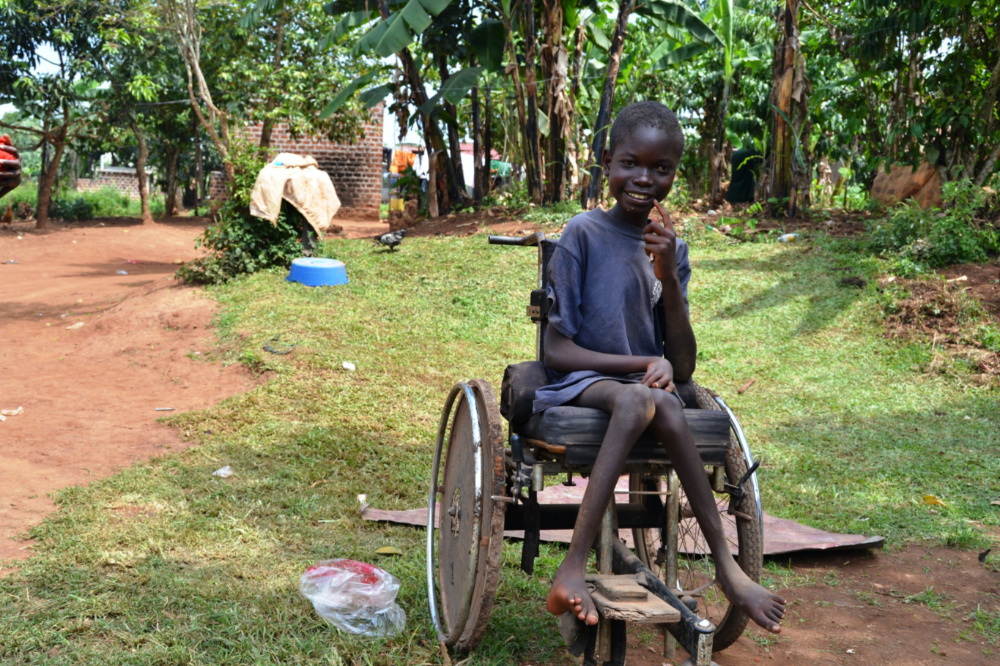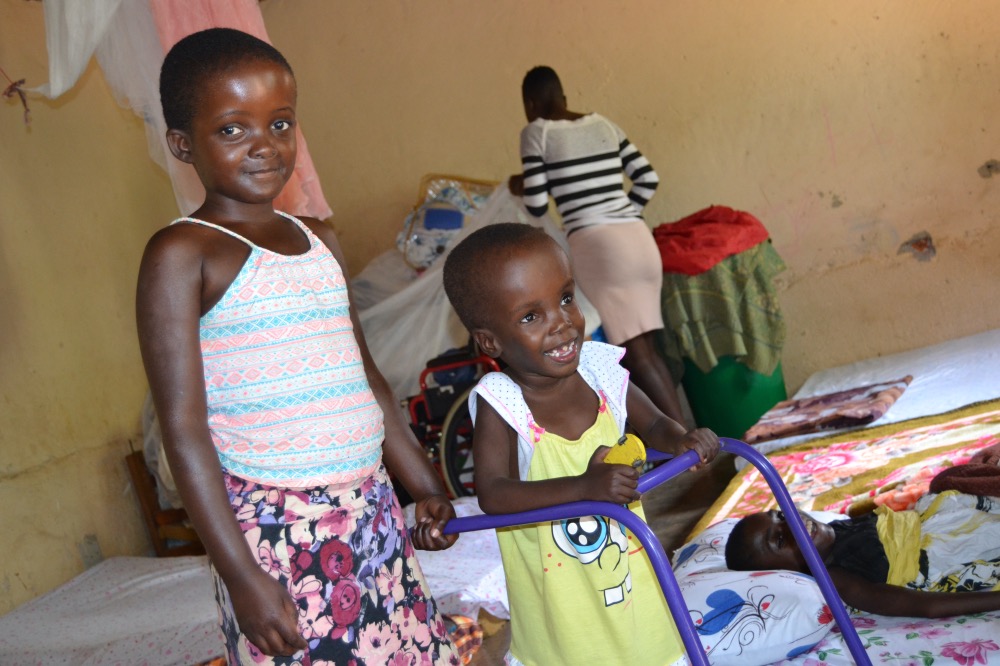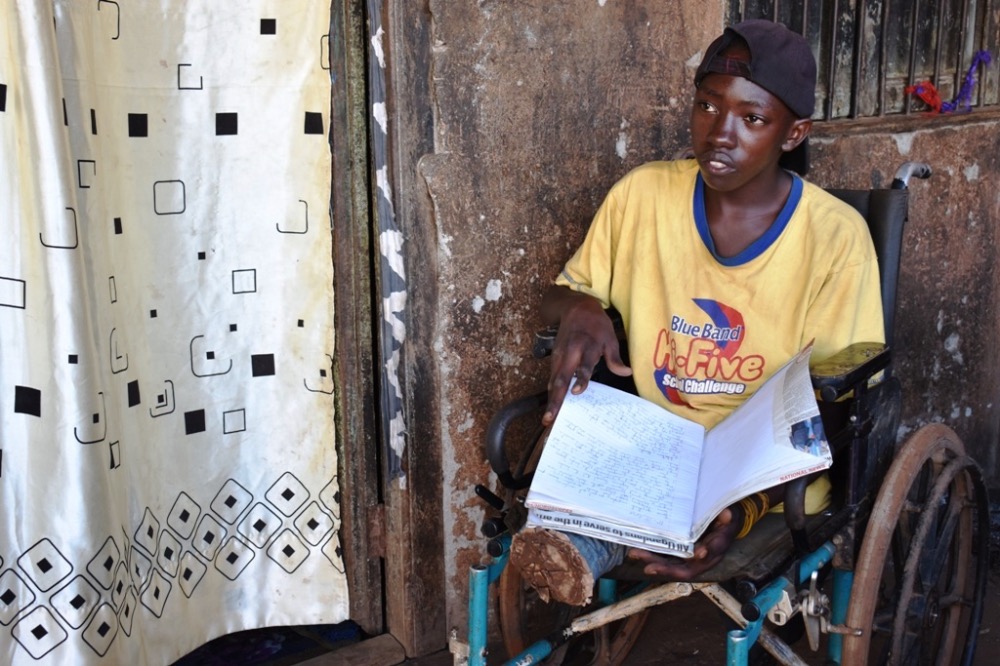
JOHN SEMAKULA looks at how Uganda’s coronavirus lockdown saw many care homes send disabled students back to their homes where they faced new struggles, including difficulties accessing education…
James* is a common sight in a village located in the central Uganda district of Mukono. So much so that the absence of the man, aged in his early 20s, at the height of the COVID-19 lockdown in Uganda made many community members suspicious that something could be wrong.
When local leaders paid his family a visit on 29th May, his mother told them she had financial challenges, and, as a result, could not meet the family’s daily food needs. To make matters worse, she said, his appetite was insatiable.
As the world was going through a lockdown, James had another lockdown within the lockdown. His mother had locked him up in a cage. The cage had been his bedroom, as well as toilet, for weeks. His mother said her trick worked because while in the cage, the family’s daily expenditure on food fell sharply. There were days when James went without a meal.
The local leaders quickly thought of another home for James and the Good Samaritan All Inclusive Day and Boarding Primary School in Nasuuti, Mukono, about 10 kilometres from his home – became his new abode.
Steven Mawejje, an administrator at the care home, says when they received James, he was immediately put on a special diet that had been recommended by a doctor. He says that as a result, James, who was suffering from malnutrition, has seen his health improve.
“He is now a jolly person, interacts with everyone and loves to listen to people’s conversations,” he says.

Children at the Good Samaritan All Inclusive Day and Boarding Primary School in Nasuuti. PICTURE: John Semakula.
James’ situation highlights the plight of people living with disabilities in Uganda, especially during the COVID-19 lockdown when resources became scarce.
Population census figures from 2014 in Uganda show that 16 per cent of the country’s total population is living with disabilities. Despite government efforts – including affirmative action programs in politics and education, many live in long term poverty with limited access to education and health facilities, poor housing facilities and unemployment.
“Currently, there are over 100 PWDs [people with disabilities] in Mukono district, who need urgent help. Their guardians keep calling us, but we lack the resources so we can’t admit them.”
– Steven Mawejje, an administrator at the Good Samaritan All Inclusive Day and Boarding Primary School in Nasuuti, Mukono.
This means many people with disabilities rely on assistance from local churches and charities. But this help decreased dramatically when many churches found themselves struggling financially after a coronavirus-related lockdown was imposed on 20th March. And while the lockdown was lifted as of 20th September, coronavirus-restrictions surrounding the number of people allowed to attend houses of worship remain in place.
Mawejje tells the Sight that due to a reduction in assistance from the churches, many care homes sent the disabled people they had been caring for back to their homes. Mawejje’s facility sent home 43 people.
Raymond Saaka is among the children the facility sent back to their homes. The physically handicapped 17-year-old lives with his grandmother, Nalongo Mutesi, who has a visual impairment. Despite that, the 65-year-old currently looks after 10 grandchildren – most of their parents have passed away.
When Saaka met with Sight‘s correspondent last month, he was beaming and eager to get back to school to meet with his friends.
Schools were closed in Uganda due to the coronavirus back in March, affecting some 15 million students. Sadly Saaka, whose family doesn’t own a television or a radio, was among the children who missed out on receiving government-issued educational reading materials due to a shortage. And they can’t afford the cost of a newspaper through which other educational resources were distributed. A government promise to buy radios for families like Saaka’s so they can listen to classes being broadcast is also, as yet, unfulfilled.
Despite his eagerness, it’s not yet certain when Saaka will be able to return to school – to date only those facing final year classes have been permitted to return so they can prepare for national examinations.
“Currently, there are over 100 PWDs [people with disabilities] in Mukono district, who need urgent help,” Mawejje says. “Their guardians keep calling us, but we lack the resources so we can’t admit them.”
(There have, however, been some exceptions – including the five people that Mawejje’s facility admitted during the lockdown. One of them – 15-year-old Marvin Ssenyonjo – was sent to the care home by his mother, when the family’s economic burden became too heavy for her to bear, and was there taught agricultural and scouting skills.)

Raymond Saaka, 17, who was among students sent home from a care facility as a result of the COVID-19 pandemic. PICTURE: John Semakula.
Muhamad Meddie, a student with a physical disability living in the eastern Uganda district of Kamuli, says that because of the lockdown he has lost touch with his teachers and friends at school as well as the Europeans who sponsor him.
The 15-year-old, who was in the second year of high school before the lockdown, tells Sight he also has never received any of the learning materials dispatched by the government and had to resort to reading his class notes. His mother, Rose Nabukwasi, says that at one point, local authorities told her to pay sh5,000 (about $US1.50) to photocopy the learning materials that the government was distributing for free. She found the cost too expensive.
Lydia Nakacwa, the head teacher of Bishop West Primary School – which operates under the auspices of the Anglican church, says she does not know the fate of those of her students with special needs. Of the 300 students at the school, some 70 had special education needs.
Nakacwa says that following the implementation of the lockdown, most of the children with special needs were taken to hard-to-reach areas where they didn’t have access to electricity and other vital learning requirements, such as television sets. She says she has only been able to trace 40 of the 70 students to give them the learning materials.
Nakachwa is also not happy with television stations. She says when the lockdown started, some television stations initiated teaching programs, but none of them hired a sign language interpreter, leaving those with hearing impairments unable to learn.
Grace Hellen Asamo, the member of parliament who represents people with disabilities from eastern Uganda, tells Sight she has brought the plight of the disabled during the lockdown to the attention of parliament, but is yet to see results.
“What we need as PWDs is affirmative action during the lockdown. Government has reopened some schools, but the President did not mention anything to do with the PWDs. Most of them come from very poor families…[Y]ou don’t just reopen schools after a long lockdown and expect them to afford the school fees.”
– Grace Hellen Asamo, the member of parliament who represents people with disabilities from eastern Uganda.
“What we need as PWDs is affirmative action during the lockdown. Government has reopened some schools, but the President did not mention anything to do with the PWDs,” Asamo says. “Most of them come from very poor families…[Y]ou don’t just reopen schools after a long lockdown and expect them to afford the school fees.”
She expresses discomfort with the idea of the government delivering learning materials to a specific location, expecting people with disabilities to travel to pick up what they need. She argues that some of the disabled have no means of transport to such centres.
Sarah Ayesiga, acting commissioner for inclusive and non-formal education in the Ministry of Education, says the department regretted not securing learning materials early enough for special needs students. She says special needs teachers have been calling the ministry for learning materials during the COVID-19 lockdown, but that they did not have any answers for them.
“It’s a big shame! As a department, we also realised that mistake but it came about because the initial education taskforce team that was selected to come up with the framework for teaching during the lockdown had left the department…” she says. “Later we were told to adapt already developed materials to make them disability-friendly yet we had to work on the initial framework together.”
She says that, since then, a series of meetings have been held to rectify the problem and that an additional framework for special needs learners has been worked out.

Muhamad Meddie, who says he has lost touch with his teachers and friends at school as well as the Europeans who sponsor him as a result of the coronavirus. PICTURE: John Semakula.
Ayesiga says the ministry invited special needs teachers to help in the process of coming up with audio versions and braille materials for special needs learners and that once the master copies are ready, there are organisations that are willing to reprint and distribute them to students
For those students with personal Braille machines, she urged teachers to engage their district COVID-19 taskforces to offer them free transport to collect learning materials.
Grace Baguma, director of the National Curriculum Development Center, has also assured the nation that the learning materials for special needs children will be availed soon.
“The work will come a bit late, but it is there,” she says. “True, the other learners are already collecting their material, but the current COVID-19 situation could not allow us to work on all the materials concurrently. You have to first write the general materials them adapt from them to friendly guides for children with special needs.”
Jason Evans, World Vision’s national director for Uganda, says by reaching out to teach children during the COVID-19 lockdown, they were able to live up to the mission and Christ’s call on “our lives in order to reach the most vulnerable children and their families across this great nation”.
According to the government, however, there is some hope for students with special needs. Patrick Muinda, the assistant commissioner for communication at the Education Ministry, tells Sight that the government has prepared study materials for people with different disabilities so they can learn at home.
“The materials have been adapted in different forms, to cater for different disabilities and they are only waiting for mass distribution,” Muinda says.
He adds that there are plans to procure devices for learning, including laptops with special software for students with special needs such as MP3 players for audio playback and sign language dictionaries.
“Adapted content will also be uploaded on the ministry’s content portal and made available to learners in the inclusive setting,” he says. “We shall be working with school authorities to distribute the materials to their learners.”
Some charities are also working to address educational needs. In the eastern Ugandan district of Soroti, for example, World Vision – an evangelical Christian humanitarian aid organisation, has been helping teachers with teaching students at their homes during the lockdown.
Some students with disabilities are among those taking advantage of the program. They congregate in one home from where the teacher conducts classes. The homes usually feature a hands-free ‘tippy tap’, which is operated by a foot lever, where children are encouraged to regularly wash their hands and, in adherence with COVID-19 prevention guidelines, the teacher, too, is always wearing a mask.
Jason Evans, World Vision’s national director for Uganda, says by reaching out to teach children during the COVID-19 lockdown, they were able to live up to the mission and Christ’s call on “our lives in order to reach the most vulnerable children and their families across this great nation”.
* Name changed to protect privacy.
Correction: James’ name has been corrected in the third paragraph due to an error that occurred in editing – apologies for any confusion.





